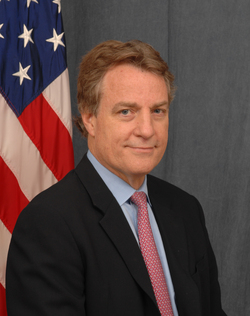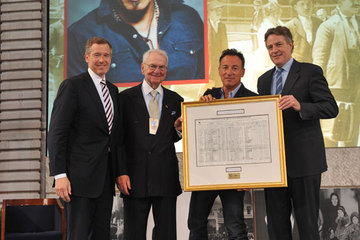By Nathan Bruschi, Harvard Business School Class of 2018 & Harbus Contributing Writer
What do brands like Target, Theranos, UnitedHealth, and Vanderbilt University have in common with the Deepwater Horizon Oil Spill and Columbine High School Massacre? All were the subjects of intense press coverage, and in each case the man brought in to weather the media maelstrom was Tom Strickland.
A lawyer by training, Strickland served in the Obama Administration's Department of the Interior as Chief of Staff and Assistant Secretary for Fish and Wildlife and Parks. There he worked to reform a department mired by scandals, both ethical and political. He also managed the department's crisis response during one of the most challenging and publicized ecological disasters in U.S. history: the Deepwater Horizon Oil spill. Now back in private law practice as a partner at WilmerHale, Strickland is much sought after for his expertise in crisis management by organizations that find themselves embroiled in controversy and on the wrong side of the media.
I reached Tom as he was hiking the Cascade Canyon Trail in Wyoming's Grand Teton National Park to get his advice on twin challenges many MBAs will face: first, how to guide brands and organizations through periods of intense negative press coverage and second, how to communicate change across institutions as large, complex, and bureaucratic as a federal agency. While Tom's formative moments came largely in the public sector, the insights he gained have broad applications in the private sector as well.
Part 1: Becoming the Eye of the Media Hurricane
Tom Strickland dates his first foray with the media to 1984 while serving as a policy director for Colorado Governor Richard Lamm. The governor was an outspoken proponent of healthcare reform and generated enormous controversy when The New York Times quoted him as saying that the terminally ill and elderly have a "duty to die and get out of the way."
"He was focused on the cost of healthcare being at the tail end of people's lives, how we should spend more money on preventative health care costs, and was speaking to a point that talked about natural cycles of life," Strickland reminisced. "It was taken out of context and it became my first real press crisis. It became an international story and was in Pravda two days later."
Strickland's crucible with the press would come years later, after a stint in the private sector advising companies with public-facing and regulatory challenges, when he returned to public service. The day before he assumed office as the United States Attorney for Colorado in 1999, 15 students were killed and 21 were wounded when two classmates opened fire on their school in the Columbine High School Massacre.
"My first press conference as U.S. Attorney probably had a thousand international media representatives. The press was doing its job but it was a feeding frenzy. I wasn't ready when it came to me and I don't think it is something that anyone can be ready for before it comes to you."
After a tenure that included vigorous prosecution of gun offenses and drug trafficking, Strickland embarked on the second of two ultimately unsuccessful campaigns for the U.S. Senate from Colorado.
"I was perhaps idealistic, perhaps naïve, about the fact that I thought that voters would vote for the person who most closely approximated where they were on the issues. I didn't fully appreciate how much the race was really about brand and narrative."
Tom now draws upon this well of experience when he helps some of the most recognizable corporate brands survive crises, often giving his clients (and now our MBA class) the following advice for communicating with media.
Strategies to employ when your brand runs into trouble:
Remember you have the right to remain silent. "Sometimes it is better not to comment on a story. Just because the press asks a question doesn't mean that you have a duty to answer it. A reporter may call you to confirm a preliminary story but oftentimes they are just fishing. The thing to do is exercise discipline. Answer the press inquiries that are important for your brand or when you need to get information out. If you are a large company, hopefully you will have a PR department that can determine whether a press inquiry is legitimate and ultimately how to respond."
Prioritize your audiences. "Any organization has multiple audiences. Depending on whether you are a public company or not, you have your shareholders, the SEC, employees, and so on. You need to determine in any given crisis which audience is the most important and which message is appropriate for that audience. Then you have to harmonize that message so that it doesn't create issues for you with the secondary audiences that are also important.
For example, if your company is hit by a grand jury subpoena, that may threaten the company's public reputation, but the key audience is the government. You don't want to say anything publicly that will be counterproductive to getting through the investigation. If you are a public company like a retail store with a credit card data breach, then you will have to engage more in public media and assuage your customers by running ads on TV or online. You may find that to calm your customer base and keep your brand intact you might disclose more than you would normally want to from a legal or regulatory exposure standpoint. If you are a private or wholesale company without a direct relationship with the public, you may want to hold things close to the chest as it is less clear what a bad story will do."
Do nothing to prolong the story. The press is never going to be satisfied. Going on offense can be the worst thing to do because it is just going to feed the stories. If you deny something, the press may write another story. If you act like you have a handle on the problem when you don't, they can write a third. Instead, the general public wants the assurance of knowing that you'll get to the bottom of the problem. Make it clear that your organization is committed to finding out what happened, what went wrong, how to fix it, and who to hold accountable. Know what your real interests are: getting through the scrutiny."
How to handle hostile media in a press conference:
Don't minimize the problem without having the facts. "Look at Chipotle. They had issues with food safety but didn't know the full scope of the problem. In that situation, you can say, 'We think the food poisoning is contained to this geographic area, we shut down these stores, we're going to get back to you with more information, and we're going to fix the problem.' Don't come in and say, 'Well, the outbreak was only in ten stores.' Because then if it turns out the outbreak is in fifty stores, you're screwed.
The single biggest mistake that business people and politicians make when they deal with a crisis is that they come in on the front end, they minimize the scope of the problem, and they lose credibility. Don't say more than you know to be the case. Just make a commitment to figure out what happened."
You may be using your subordinates' facts, but it is your credibility on the line. "In 2003, the Boulder District Attorney's office launched an investigation at the University of Colorado as to whether certain football players invited high school recruits to a party that had sex and drugs. The President of the University checked with the head football coach and the athletic director, was told that there was nothing to the allegations, and held a press conference asserting that there weren't any problems. As the investigation expanded it turned out she had to amend those statements. Ultimately that press conference may have cost the President her job because she lost her credibility and was unable to regain it. Once you lose your credibility, often it's gone forever."
Empathize. "After the Deepwater Horizon Oil Spill, BP's chairman Tony Hayward was quoted as saying that he 'wanted to get his life back.' He lost his job in part because of that comment. That comment showed a lack of sensitivity that what was inconveniencing him and his schedule was life-threatening to people along the gulf coast."
Follow disclosure rules. "If you are a public company you have certain disclosure requirements and you have to be cognizant of getting information out to everyone at the same time, per SEC regulations. There are other 'rules of the road' for businesses, including about answering questions that would affect your shareholders' interests."
Part 2: Using a Bullhorn to Change Bureaucracy
While the Senate eluded Strickland, his close friend Ken Salazar won election in 2005. When Salazar was tapped by President-elect Barack Obama to serve as Secretary of the Department of the Interior in 2009, he brought Strickland with him to be Chief of Staff, overseeing all aspects of the department including political strategy and public relations.
"Right after Secretary Salazar was sworn in on the day of the President's Inauguration, I remember White House Chief of Staff Rahm Emanuel coming over to me, thumping me on the chest, and saying, 'Clean up that mess. Clean up that mess at the Department of the Interior.'"
Under the previous administration, the Department had been under criminal investigation. A number of top officials were implicated - and the Deputy Secretary was sentenced to prison - in the Jack Abramoff corruption scandal, in which personal gifts and campaign contributions were illegally exchanged for action on Native American gambling interests. Furthermore, investigations found that senior officials had compromised the Department's non-partisan scientific work for personal and political gain, notably by prematurely removing animals from the endangered species list and denying the existence of climate change.
"The Department has 77,000 career employees and a budget of $20 billion. We manage 25% of the land in America, the off-shore oil and gas, the relationship with the Native American community, the Endangered Species Act, and all the national parks. This huge institution just moves along, and every few years a new group of about 100 political employees come in. I came in as one of the first four political appointees and our task was to rebuild the department's image and culture."
So how do you become an agent of change, even when faced with a seemingly insurmountable task?
1. Don't waste your time on the lowest performers. "Identify the best people who have the greatest credibility and respect within the institution. Focus on earning their respect and bringing them on to your team as you want to be identified with performers of high integrity and high ability. Below that group there are a lot of good people who are not leaders; they will follow the leaders that have identified with you. Then near the bottom there are going to be people who are counterproductive. When you come in don't break your pick on that bottom group of folks. Concentrate on the top tier, earn their respect, win them over, listen to them, because then you'll earn the heart and soul of the organization."
2. Listen. Particularly to the cream of the crop. "When I came into the U.S. Attorney's Office, I was sure there was skepticism amongst career prosecutors about my motives since I had not been a federal prosecutor and had previously run for the Senate. I made it my business to sit down with every single one of our 80 prosecutors for an hour each. I just said, 'Tell me how you think the office is being run. What are the strengths and weaknesses? What kind of support do you need?' I had also done my homework and determined that there were 5 out of that 80 who were the real leaders and I made a point to win them over so they would help communicate my vision with folks down the organization."
3. Remove "I" from your vocabulary. "One of the biggest mistakes I see young leaders make in business and government is being excessively self-centered and self-referential in communications. For example, saying 'I'm going to fix this.' 'I'm going to save this.' 'I'm going to solve this.' Those 77,000 career people at DOI see people come in self-centered and focused on promoting their political careers, and they have developed a fine ear for who really cares about the mission."
4. Manage external expectations. "I preach to my clients: under-promise and over-perform. Success is about expectations externally. If you come in as if you have all the answers, then the rank and file will think that you're just another blowhard that waltzed in."
5. For specialized teams, choose natives to lead. "We had to fill the top leadership for the Bureau of Land Management, United States Fish and Wildlife Service, National Park Service. Because each agency is so unique, trying to bring in someone in to lead from the outside would be like bringing in an outsider to command a platoon of marines. We went looking for who was the best person with the most credibility in each of these organizations. In each case that was a careerist who gave up their job for a political appointment."
Through his time at the Department of the Interior, Strickland made a difference by launching what Secretary Salazar termed a "21st Century Conservation Agenda" - expanding the Great Outdoors Colorado program he founded into America's Great Outdoors Initiative, protecting endangered species such as the polar bear and bluefin tuna, and restoring the Florida Everglades. Since then he has helped save many of the brands where HBS students may aspire to work. With a school mission of "We educate leaders who make a difference in the world," it would seem that Harvard Business School would not be doing its job unless its graduates also found themselves the media spotlight, either by upsetting existing orders to make change, pushing the envelope of an industry, or fighting fights that others choose to ignore.
-------------
Nathan Bruschi (HBS '18), is a joint degree student at Harvard Kennedy School and spent much of his childhood in national parks chasing merit badges as a Boy Scout. Prior to HBS, he served in the United States Navy and at the White House. He spends his spare time begrudgingly at Shad Fitness Center, inexplicably at Felipe's Taqueria, and undeservedly at Mike's Pastry. Follow him @NathanBruschi.
For more articles published by The Harbus, please visit www.harbus.org.



